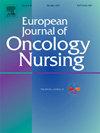基于奥瑞姆自我护理缺失理论的培训对乳腺癌患者处理化疗相关副作用和自我护理行为的影响:随机对照试验
IF 2.7
3区 医学
Q1 NURSING
引用次数: 0
摘要
目的 研究基于奥瑞姆自我护理缺失理论的培训对乳腺癌患者在化疗期间的身体、社交和心理健康以及自我护理行为的影响。 方法 该随机对照试验采用前测-后测实验设计。研究样本包括在土耳其泰基尔达一所大学医院肿瘤内科接受环磷酰胺-表柔比星或环磷酰胺-阿霉素治疗的 62 名乳腺癌患者(干预组和对照组各 31 人)。干预组的乳腺癌患者接受了基于奥瑞姆自我护理缺陷理论的培训,内容涉及化疗期间的身体、社交和心理健康以及自我护理行为。研究人员进行了两次面对面的随访(在第二和第三次化疗周期,每次间隔 3 周)和一次测试后评估。结果南丁格尔症状评估量表(N-SAS)的第一次随访、第二次随访和后测得分显示,根据身体、社交和心理分维度和总分,干预组比对照组在生活质量方面经历的负面变化更少(p <.05)。干预组在自我护理行为方面最积极的变化体现在护理和保护头发、做家务时使用防护手套、监测体重以及在血值低时限制社交聚会以防止可能的感染等项目上。应经常评估化疗相关副作用。此外,应确定患者的需求,并根据他们的需求进行培训。本文章由计算机程序翻译,如有差异,请以英文原文为准。
Effect of training based on Orem's self-care deficit theory on breast cancer patients' management of chemotherapy-related side effects and self-care behaviors: A randomized controlled trial
Purpose
To examine the effects of training based on Orem's self-care deficit theory on breast cancer patient's physical, social, and psychological well-being and self-care behaviors during chemotherapy.
Methods
This randomized controlled trial was based on a pretest–posttest experimental design. The study sample consisted of 62 breast cancer patients (n = 31 for each of the intervention and control groups) receiving cyclophosphamide–epirubicin or cyclophosphamide–adriamycin treatment in the medical oncology department of a university hospital in Tekirdağ, Turkey. The breast cancer patients in the intervention group received training based on Orem's self-care deficit theory regarding physical, social, and psychological well-being and self-care behaviors during chemotherapy. The researcher conducted two face-to-face follow-ups (during the second and third chemotherapy cycles, 3 weeks apart) and a posttest assessment. Pretest and posttest symptom scores and self-care survey results were compared for both groups.
Results
The Nightingale Symptom Assessment Scale (N-SAS) first follow-up, second follow-up, and posttest scores showed that the intervention group experienced fewer negative changes in quality of life than the control group based on the physical, social, and psychological subdimension and total scale scores (p < .05). The most positive changes in the intervention group's self-care behaviors were observed for items about caring for and protecting hair, using protective gloves when doing chores, monitoring weight, and limiting social meetings when blood values were low to protect against possible infection.
Conclusion
Training based on Orem's self-care deficit theory positively influenced breast cancer patients' management of chemotherapy-related side effects and self-care behaviors. Chemotherapy-related side effects should be evaluated frequently. Moreover, patients' needs should be determined, and training should be tailored to their needs.
求助全文
通过发布文献求助,成功后即可免费获取论文全文。
去求助
来源期刊
CiteScore
4.40
自引率
3.60%
发文量
109
审稿时长
57 days
期刊介绍:
The European Journal of Oncology Nursing is an international journal which publishes research of direct relevance to patient care, nurse education, management and policy development. EJON is proud to be the official journal of the European Oncology Nursing Society.
The journal publishes the following types of papers:
• Original research articles
• Review articles

 求助内容:
求助内容: 应助结果提醒方式:
应助结果提醒方式:


